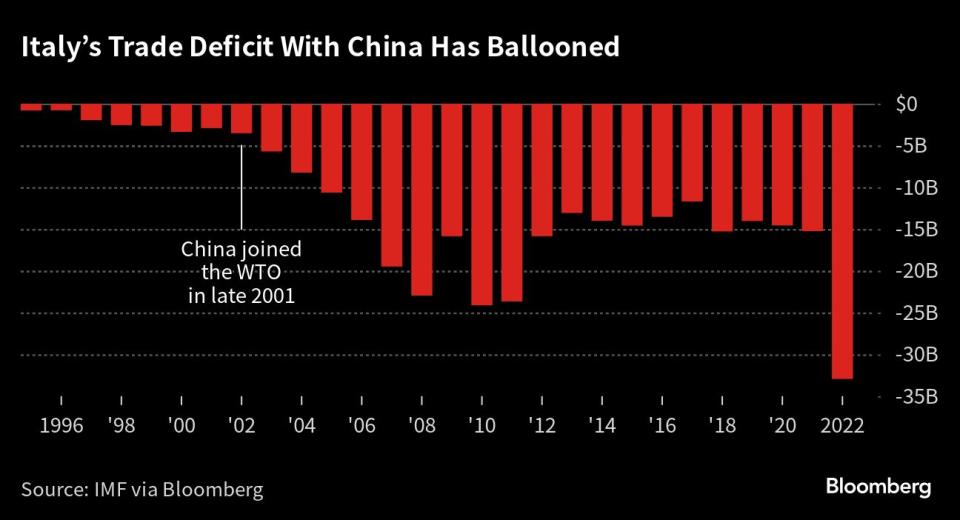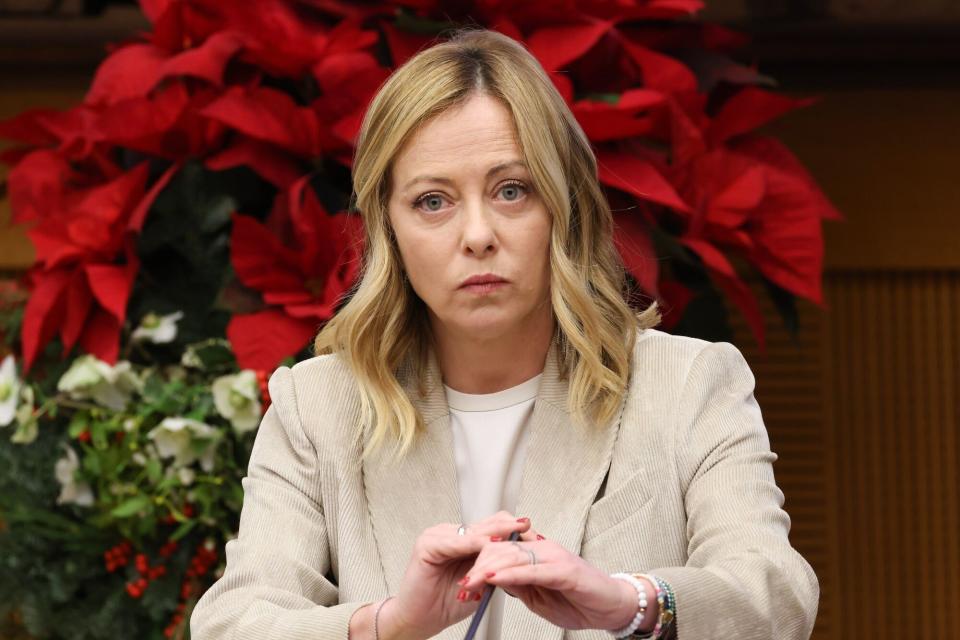Meloni Seeks China Reset After Italy Ditches Belt and Road Pact
- Oops!Something went wrong.Please try again later.
- Oops!Something went wrong.Please try again later.
(Bloomberg) -- Italian Prime Minister Giorgia Meloni is embarking on a charm offensive with Beijing as she looks to shield trade and economic ties after pulling Italy out of China’s controversial global investment initiative last year.
Most Read from Bloomberg
Biden Returns to White House as Israel Braces for Iran Response
Israel Versus Iran — What an Open War Between Them Could Look Like
Trump in Line for Extra SPAC Payday Despite $4.5 Billion Selloff
Italian Foreign Minister Antonio Tajani will meet Chinese Commerce Minister Wang Wentao in Verona, Italy, on Friday to kick off an entrepreneurial dialog, and Meloni will travel to China in the coming months, according to a person familiar with the plans who spoke on the condition of anonymity.
The outreach from Rome comes after the European Union has launched a massive effort to de-risk from China to better protect supply lines and ensure access to critical materials and technology, particularly after Beijing has shown support for Moscow in its war against Ukraine.
German Chancellor Olaf Scholz will travel to China over the weekend to discuss trade and Ukraine.
The strengthening of ties with Beijing is part of a new push for Italy’s diplomacy that Edmondo Cirielli, the deputy foreign affairs minister, has described as “pragmatic but not cynical.” The approach hinges on a strong commitment to NATO and the transatlantic partnership while fostering good relations with so-called systemic adversaries, such as Beijing, Tehran, and even Moscow.
Italy was the sole Group of Seven nation to sign onto Chinese President Xi Jinping’s Belt and Road Initiative — a global infrastructure pact aimed at expanding Beijing’s influence primarily in Asia, Africa and Eastern Europe. The move drew considerable ire from the US and its allies.
In exiting the BRI, Rome, which holds the G-7 presidency this year, wanted to avoid provoking any type of backlash from China, which is a key export market. Even as it prepared to publicly exit the pact, Italy paid close attention to how it projected this message to the world, avoiding an overt departure from the initiative.
Italy’s main export to China is pharmaceutical products, which amounted to €4.4 billion ($4.7 billion) last year, almost a fifth of the €19 billion in total exports. China exported €46.8 billion to Italy.
“We want to launch a new phase in the relationship between Italy and China and invest in a bilateral partnership,” Tajani said on Thursday.
The move may be a political win for Meloni if she manages to retain trade ties with China that are important for the business community, while also having kept a promise to her party, the Brothers of Italy, which wanted Rome to quit the BRI, which is also referred to as the Silk Way.
Meloni’s government currently enjoys one of the biggest majorities in parliament in recent times and upcoming European elections in June could see her play a pivotal role in determining the balance of power in Brussels.
“The government has kept its electoral promise to exit the Silk Road because it was clear to everyone that the agreement was not in Italy’s favor,” Giangiacomo Calovini, a member of parliament for Meloni’s party on the foreign affairs committee, said in an interview. “In the current, extremely volatile situation, there is nothing bad in keeping an open dialog with Beijing” in hopes it strengthens trade with a market as important as China’s, he said.
Most Read from Bloomberg Businessweek
Toyota Pins Its Hopes on Revamped 4Runner to Beat Ford and Hyundai
Race for AI Supremacy in Middle East Is Measured in Data Centers
Everyone Is Rich, No One Is Happy. The Pro Golf Drama Is Back
©2024 Bloomberg L.P.



